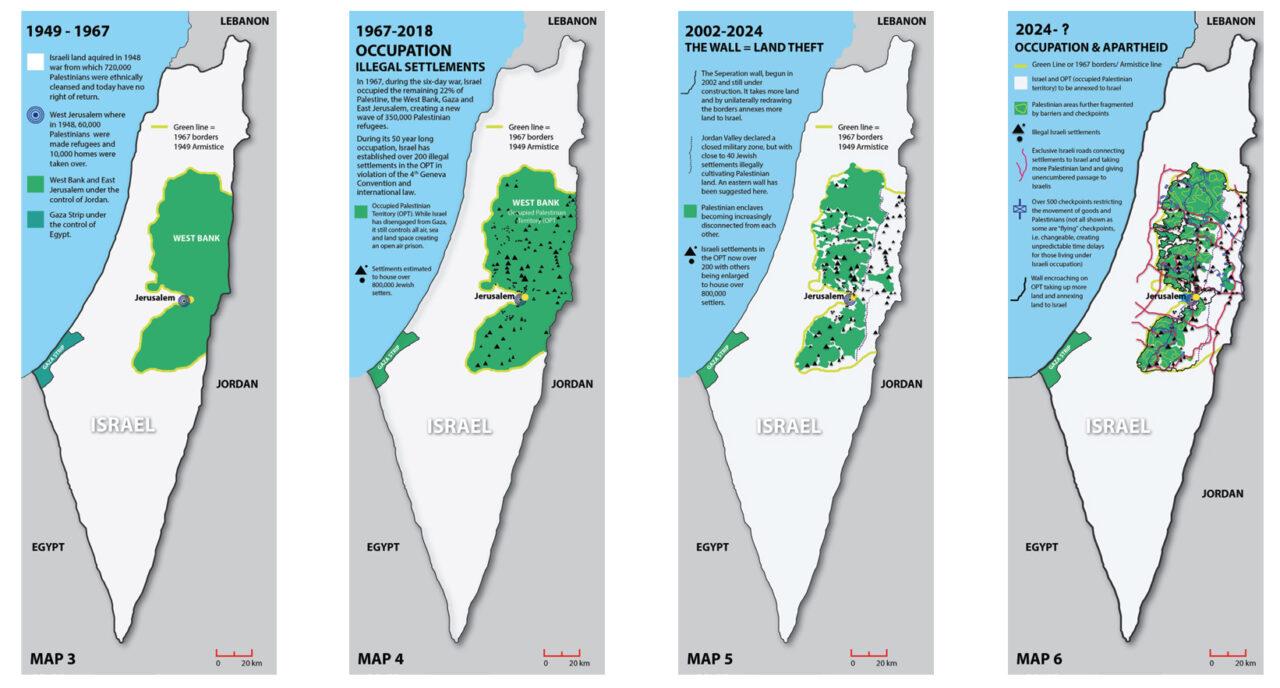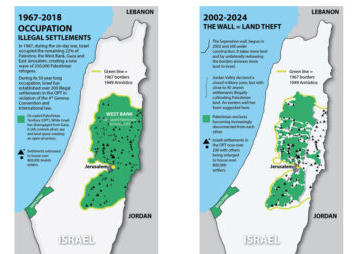While forcing recognition of a Palestinian state is a victory for the solidarity movement, it is clear that a two-state solution is dead. But is a ‘single democratic state’ a useful proposal to take the movement forward? Deputy editor David Lockwood takes a look.

In August, the Australian Labor government announced its intention to recognise a Palestinian state at the UN General Assembly in September. At long last, a concrete manifestation of the ALP’s seven-year standing commitment to recognise Palestine as part of a ‘two-state solution’ for Palestine and Israel. A policy shift Prime Minister Anthony Albanese’s faction brought to the ALP national conference in 2018.
Nearly two years after the events of 7 October and after more than 60,000 Palestinians have been slaughtered by Israel, this solution has once again become flavour-of-the-month among many Western powers. According to a joint statement by Albanese and Foreign Minister Penny Wong on 11 August, Australia’s move will “contribute to the international momentum towards a two-state solution”, which is “the basis of peace and security for the peoples of the region”.
Problem: it is no such thing. To start with, the two dominant powers in the region, the US and Israel, both oppose it. Wong and Albanese themselves pointed out that the Netanyahu government “is extinguishing the prospect of a two-state solution” by expanding illegal Israeli settlements on Palestinian land, threatening to annex the Occupied Palestinian territories and bluntly declaring that no such state will ever exist. The US administration, meanwhile, condemned a recent international conference on the two-state solution as a “publicity stunt” that will “prolong the war, embolden Hamas and reward its obstruction”.
And the response of Netanyahu to Albanese’s much delayed step to recognise Palestine? The Israeli prime minister has condemned the Australian prime minister for all the ages for the “weakness that he showed in the face of these Hamas terrorist monsters”.
In any case, of what would the proposed two states consist? The current Israel, sitting happily alongside, Gaza, East Jerusalem and the West Bank controlled by the people of Palestine? No, because Israel’s rulers have made it perfectly clear that the current Israel is not enough. They want Gaza, the West Bank and East Jerusalem swallowed up into ‘Greater Israel’ – that’s the whole point of the genocide in Gaza and the steady, violent expansion of Zionist settlements in the West Bank. And this is not just down to Netanyahu, but in the very logic of Zionism itself.
Even if that were not the case, the Palestinian state envisaged in the schema proposed in Brussels, London, Berlin, Paris and now Canberra is an absurdity. Gaza has been smashed to pieces. And it would take strong measures (and probably violent ones) to remove Zionist settlers from the West Bank. On top of that, the ‘Palestinian state’ would have ill-defined borders, be permitted no armed forces and a political system dictated by the West. The Palestinian people would have no control over this formation.
Yet the Western powers (now including Australia) continue preaching a two-state solution as if it were something achievable and capable of stopping Israel’s war and genocide.
The next most favoured solution, particularly now the pro-Palestinian movement has realised the chimera of two-states, is a one-state solution – in which the current borders of Israel, Gaza and the West Bank are dissolved into something approaching a democratic state, with universal suffrage and all the trimmings. But this is a non-starter as well.
Consider the question historically.
Israel is a colonial settler state.
Karl Kautsky, the leading Marxist thinker of the Second International at the beginning of the 20th century, divided colonies into two types: ‘exploitation colonies’ in places like India and ‘work colonies’, where the direct producers are settlers themselves, such as Australia. Instead of exploiting the native masses, the colonists exclude them, drive them off the land, kill them. From the start Zionism set itself the aim of establishing a work colony – an ongoing project. Being a work colony, the system is designed to discriminate in favour of Jewish labour against Arab labour. In work colonies, a new settler nation comes into existence – as happened in Australia, New Zealand and Palestine.
At the moment the Israeli-Jewish nation is a privileged, oppressor, nation. Israeli-Jewish workers are not going to swap their position in that nation merely to have permission to exist as Jews in a putative single-state Palestine (if that were possible). Nor are they going to accept a reversal of the poles of oppression.
While its foundation was an act of oppression, there now exists an historically constituted national grouping of Hebrew speakers in Palestine-Israel.
Israel, founded as it was on a mass act of ethnic cleansing, has since 1948 gone hand in hand with the coming into existence and consolidation of a definite Israeli Jewish nation – Israeli Jews are united in the same economy, speak the same language, inhabit the same territory, have the same culture and sense of identity. You cannot uninvent the historically constituted Israeli Jewish nation, and it would be deeply unMarxist and reactionary to try to abolish it – they would desperately fight you with all means at their disposal and at huge cost in terms of human suffering and lives.
Settlement must be democratic
The single democratic secular state now advocated by most on the left cannot be democratic if the solution is envisaged purely within Palestine and not part of a regional democratic settlement, led by the Arab working masses.
Any settlement must consider the democratic rights of all national groupings in the region.
So, if not one or two states, then what?
The dominating power holding the Middle East pieces in place is the United States. It does so because of the region’s crucial resource and strategic position. Up to now, it has done this through the exercise of Israeli power, which the US finances and supplies.
The only real solution in the region is to break the power of the US – and that cannot be done in Palestine alone. That is why the perspective of socialism and a regional Arab revolution led by the working class is absolutely essential. There can be no democratic solution solely within the borders of present-day Israel-Palestine.
As an Ottoman Palestine-born Jewish Marxist, Yigael Gluckstein – who became Tony Cliff – once remarked, the road to Jerusalem and Palestinian freedom is through the streets of Cairo, Beirut, Damascus and Baghdad.

